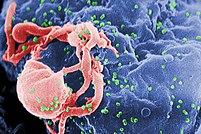Zur Hausen discovered two high-risk types of the HPV virus and made them available to the scientific community, ultimately leading to the development of vaccines protecting against infection. Two vaccines, Gardasil and Cervarix, are now commercially available.
 Image via WikipediaThe Nobel Assembly noted that Barre-Sinoussi and Montagnier's discovery was one prerequisite for understanding the biology of AIDS and its treatment with antiviral drugs. The pair's work in the early 1980s made it possible to study the virus closely. It allowed scientists to identify important details in how HIV replicates and how it interacts with the cells it infects. It also led to ways to diagnose infected people and to screen blood for HIV, which has limited spread of the epidemic, and helped scientists develop anti-HIV drugs.
Image via WikipediaThe Nobel Assembly noted that Barre-Sinoussi and Montagnier's discovery was one prerequisite for understanding the biology of AIDS and its treatment with antiviral drugs. The pair's work in the early 1980s made it possible to study the virus closely. It allowed scientists to identify important details in how HIV replicates and how it interacts with the cells it infects. It also led to ways to diagnose infected people and to screen blood for HIV, which has limited spread of the epidemic, and helped scientists develop anti-HIV drugs. The French pair were embroiled in a heated debate throughout the 1980's with Dr. Robert Gallo. Gallo's dispute with Montagnier reached such a level in 1987 that the heads of State, Reagan and Chirac signed an agreement dividing millions of dollars in royalties from the AIDS blood test based on the two researchers' findings.
In the 1990s, however, the U.S. government acknowledged that the French deserved a greater share of the royalties. The admission solidified the French position that Montagnier had isolated the virus in 1983, a year before Gallo.
The press release for the announcement of the Medicine Prize is here.
![Reblog this post [with Zemanta]](http://img.zemanta.com/reblog_e.png?x-id=a0e82ef2-62e8-44f1-9d90-1a3e4dc48e2f)

